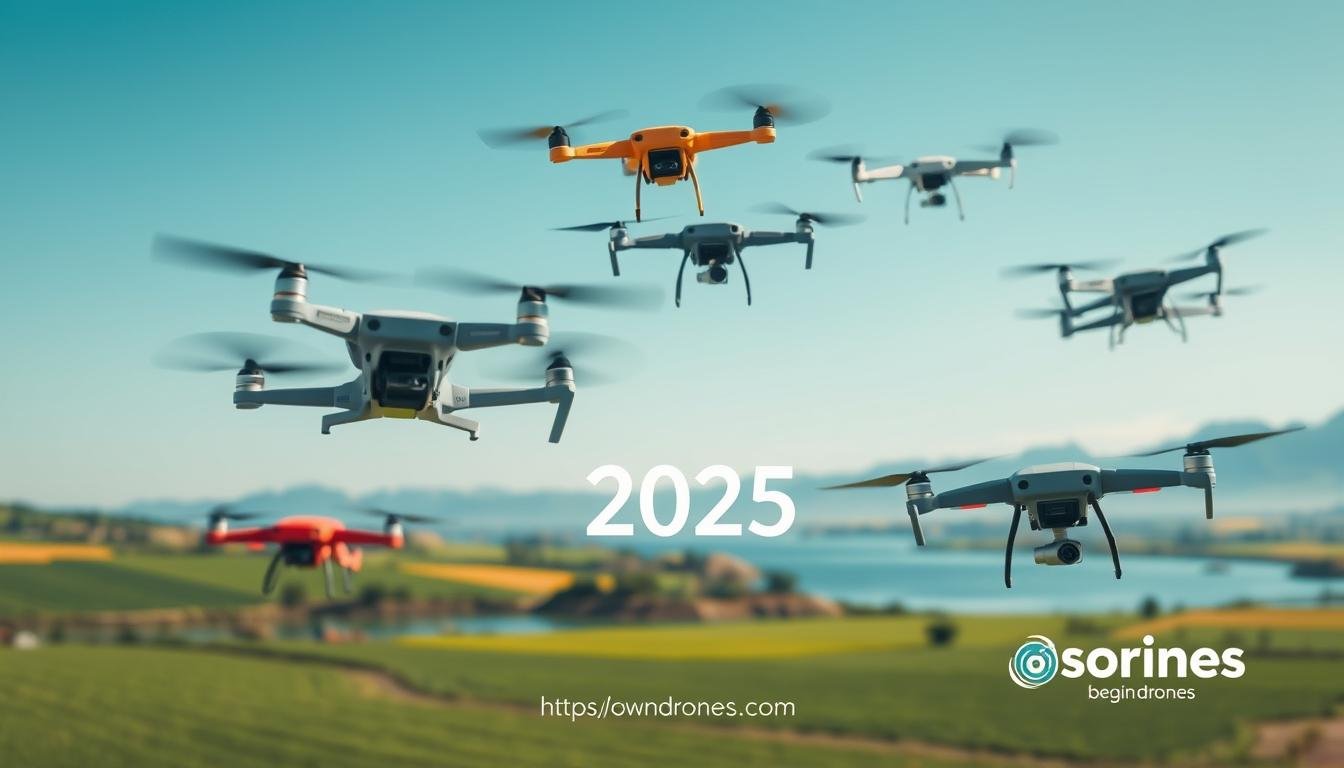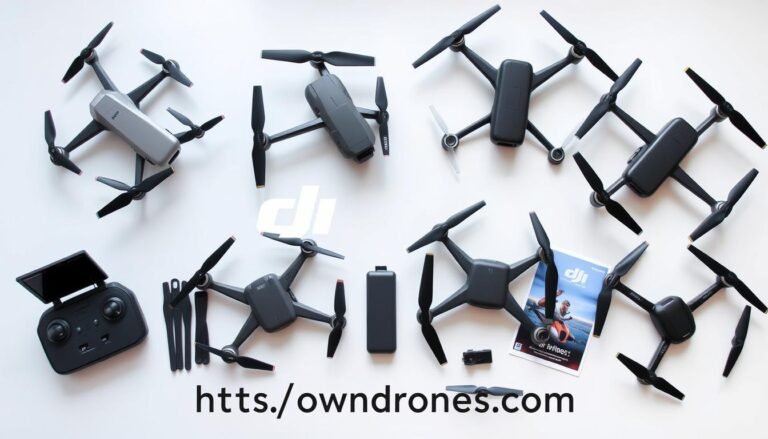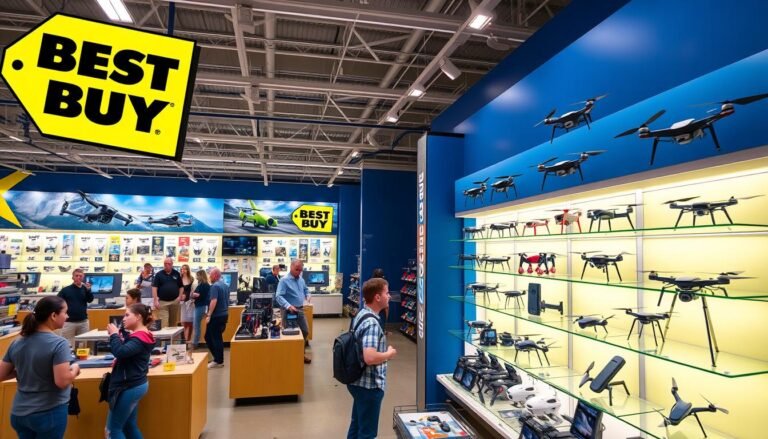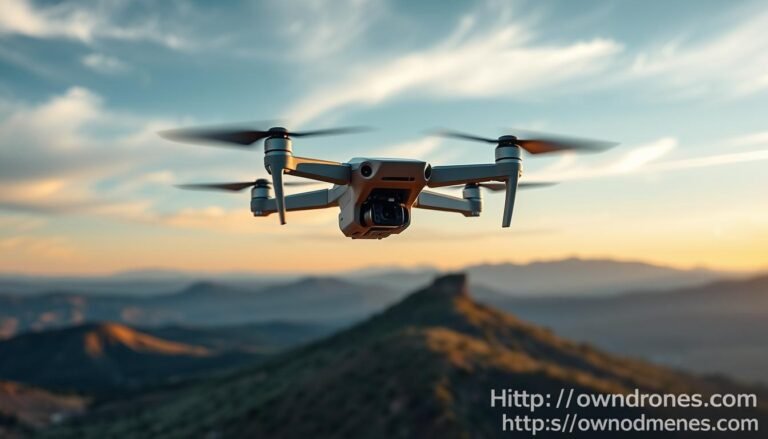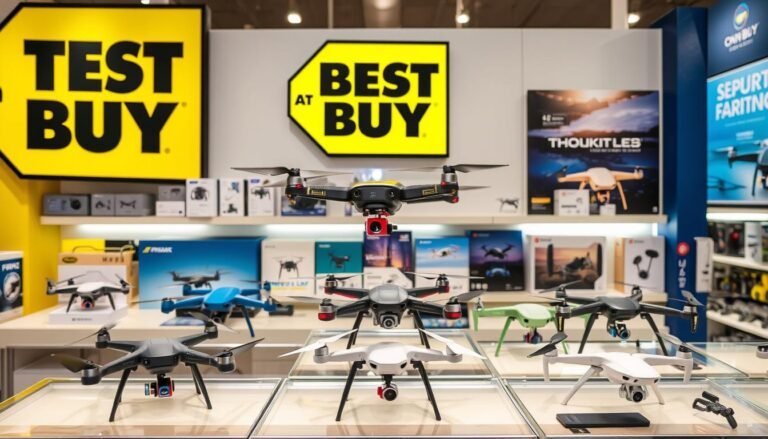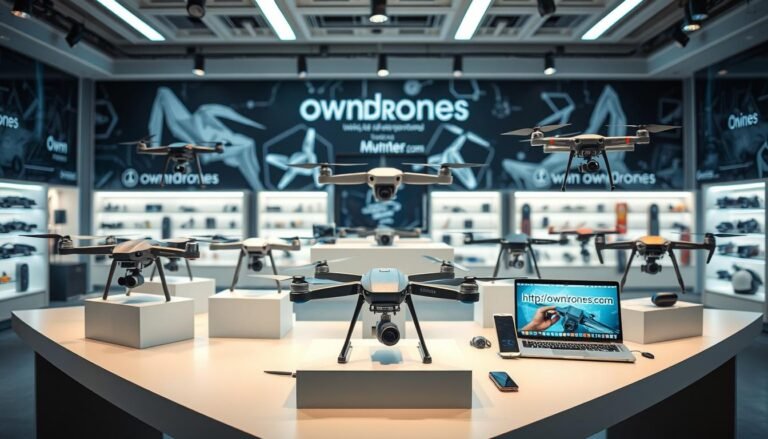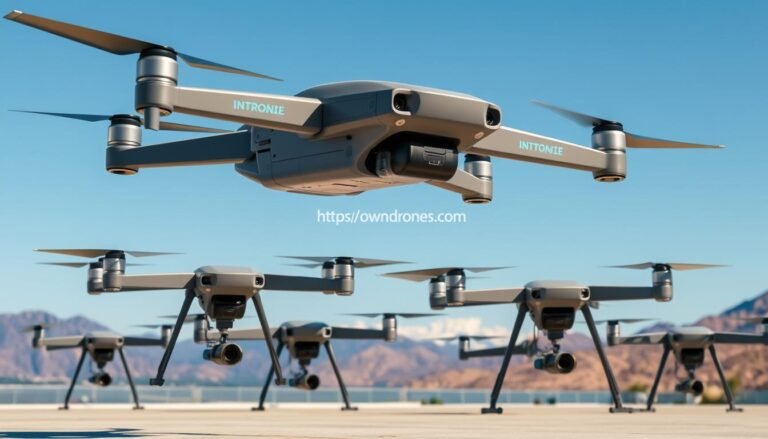The Best Drones for Beginners: 2025 Top Picks
Ready to fly your first drone? Choosing a starter drone can be tricky. We’ve tested the top beginner drones of 2025 to help you decide.
Our top pick is the DJI Mini 4K. It’s light, compact, and easy to fly. Its 4K video and 12MP stills capture stunning aerial footage.
On a budget? Try the Ryze Tello. It’s affordable yet packed with features. For a premium experience, consider the DJI Mini 4 Pro.
Worried about the potential DJI ban? The Autel Evo Nano+ is a great alternative. It offers excellent image quality and collision detection.
Interested in FPV flying? The BetaFPV Cetus X is perfect for beginners in this exciting drone category.
Key Takeaways:
- DJI Mini 4K is the best all-round drone for most beginners, with its lightweight design, intuitive controls, and 4K camera.
- Ryze Tello offers the best value for budget-conscious beginners.
- DJI Mini 4 Pro is the top choice for those seeking a premium beginner drone experience.
- Autel Evo Nano+ is the best DJI alternative for beginners, with impressive image quality and collision detection.
- BetaFPV Cetus X is the best option for those looking to get into FPV flying as a beginner.
Introduction to Drones for Beginners
Drones are remote-controlled aircraft that come in various sizes and designs. These unmanned aerial vehicles (UAVs) cater to different skill levels and purposes. Understanding the basics of drone technology is key for newcomers.
There are several types of drones to explore. Camera drones capture aerial photos and videos. Racing drones excel in speed and agility for competitions.
Toy drones are simple and affordable, perfect for beginners. Professional drones serve commercial and industrial needs.
To grasp how drones work, let’s look at their main parts:
| Component | Function |
|---|---|
| Propellers | Provide lift and allow the drone to fly |
| Motors | Rotate the propellers and control the drone’s movement |
| Battery | Powers the drone and determines flight time |
| Controller | Allows the pilot to remotely control the drone |
| Sensors | Help the drone navigate and avoid obstacles |
Picking the right drone is crucial for beginners. Look for models with user-friendly controls and automated flight modes. Obstacle avoidance sensors, longer flight times, and durability are also important features.
- Beginner-friendly controls
- Automated flight modes
- Obstacle avoidance sensors
- Longer flight times
- Durable construction
The drones recommended for beginners all weigh less than 250g, offering less flight restrictions in this drone category.
Grasping drone basics and selecting the right model sets you up for success. You’ll soon be soaring through the exciting world of drones with confidence.
What to Look for in a Beginner Drone
Choosing your first drone requires careful consideration. User-friendly drones make aerial photography easier for beginners. Let’s explore key features to look for.
Ease of Use
Novice pilots need drones that are simple to operate. Seek models with one-key takeoff, landing, and altitude hold. These features help maintain control and prevent accidents.
Flight Time and Range
Check the drone’s flight time and range capabilities. Longer durations and greater distances allow for better shot opportunities. The DJI Mini 4 Pro offers 34 minutes of flight time.
It can fly up to 20km or 12.4 miles. With a Battery Plus, flight time extends to 47 minutes.
Camera Quality
For aerial photography, camera quality is vital. Look for high resolution and stabilization in beginner drone cameras. The DJI Mini 4 Pro has a 48MP camera.
It supports 4K60 video. The Autel Robotics Evo Nano+ provides stabilized 4K30 video and 50MP photos.
Safety Features
Safety should be your top concern when selecting a beginner drone. Seek models with obstacle avoidance and emergency stop functions. The DJI Mini 4 Pro excels with automatic obstacle avoidance.
“The DJI Mini 3 is recommended as the best drone under $500, offering great 4K30 video recording capabilities.” – Drone Expert
Focus on ease of use, flight capabilities, camera quality, and safety features. These factors will guide you to the perfect drone for your needs.
DJI Mini 4K: The Best All-Round Drone for Most Beginners
The DJI Mini 4K is a top pick for new drone pilots. This compact drone, released in April 2024, offers impressive features. Let’s explore the DJI Mini 4K specs and features that make it great for beginners.
Lightweight and Compact Design
The DJI Mini 4K weighs just 249 grams (8.7 oz). This puts it under the 250g limit, meaning fewer flight rules in many countries.
When unfolded, it measures 178 x 141 x 139 mm (7 x 5.55 x 5.47 inches). You can easily carry it in a backpack or pocket.
Intuitive Controls and Automated Modes
This drone is perfect for new pilots. It has a 10km (6.21 miles) range and can handle winds up to 21 mph.
You get up to 31 minutes of flight time per charge. Real-world times are closer to 21 minutes, giving you plenty of practice time.
4K Video and 12MP Stills
The DJI Mini 4K packs a powerful 12MP 1/2.3-inch CMOS sensor. It captures 4K video at 30 FPS and 2.7K video at 60 FPS.
You can also shoot 1080p video at up to 60 FPS. This drone delivers crisp footage of landscapes and action scenes.
The standard kit costs $300. The Fly More Bundle, with extra batteries and accessories, is $431.
Ryze Tello: The Best Budget Beginner Drone
The Ryze Tello is a top choice for an affordable beginner drone. It’s designed with DJI, ensuring reliability and user-friendliness. This budget-friendly drone offers quality without breaking the bank.
The Ryze Tello is lightweight and compact, perfect for on-the-go flying. It has responsive controls and uses the intuitive Tello smartphone app. This makes it easy to learn basic flight maneuvers.
At just $99, the Ryze Tello is an excellent budget option. It offers more flight time and better camera resolution than cheaper alternatives. The HASAKEE Q11 and Q9C cost less but have shorter flight times.
| Drone | Price | Flight Time | Weight | Camera |
|---|---|---|---|---|
| Ryze Tello | $99 | 13 minutes | 80g | 5MP, 720p |
| HASAKEE Q11 | $49.99 | 26 minutes | 100g | 1080p HD WiFi |
| HASAKEE Q9C | $59.98 | 20 minutes | 397g | 720p HD WiFi |
The Ryze Tello captures 5MP photos and 720p HD videos. This is great for learning aerial photography basics. Its lightweight design complies with FAA regulations, ensuring worry-free flying.
The Ryze Tello is perfect for beginners on a budget. It’s user-friendly, durable, and takes impressive photos for its price range.
The Ryze Tello stands out as the best cheap beginner drone. It’s affordable, easy to use, and performs reliably. For those new to drones, it’s an excellent entry point.
DJI Mini 4 Pro: The Best Premium Beginner Drone
The DJI Mini 4 Pro is perfect for beginners wanting advanced features. It offers impressive low-light performance and obstacle avoidance. The drone also has versatile automated flight modes for stunning aerial shots.
Priced at $759 in the US and £759 in the UK, it’s a great value. The Mini 4 Pro has an 8/10 rating for its camera, design, and safety features. Weighing under 250 grams, it’s exempt from many regulations in the UK.
Enhanced Low-Light Performance
The Mini 4 Pro has a 1/1.3-inch 48-megapixel Quad Bayer image sensor. It records 4K video at 60fps and 10-bit D-Log M video. With dual native ISO and Night Mode, it delivers improved low-light video quality.
Omnidirectional Obstacle Avoidance
Safety is key with the Mini 4 Pro’s true omnidirectional obstacle avoidance. This tech makes it hard to crash, giving beginners peace of mind. The ActiveTrack 360 system allows for autonomous object tracking.
Versatile Automated Flight Modes
The Mini 4 Pro offers many automated flight modes for stunning footage. Its camera rotates 90 degrees for vertical filming, ideal for TikTok and Instagram Reels. You get up to 34 minutes of flying time on a full charge.
| Feature | DJI Mini 4 Pro |
|---|---|
| Price | $759 (US) / £759 (UK) |
| Weight | Under 250g |
| Camera | 1/1.3″ 48MP Quad Bayer, 4K@60fps, 10-bit D-Log M |
| Obstacle Avoidance | Omnidirectional |
| Max Speed | 37 mph |
| Flight Time | Up to 34 minutes |
The Mini 4 Pro is great for beginners seeking a premium drone experience. It’s compact, about four times smaller than the Phantom 4 Pro. This makes it ideal for everyday aerial photography and videography.
Autel Evo Nano+: The Best DJI Alternative for Beginners
Looking for a high-quality drone? Consider the Autel Evo Nano+. It’s a great alternative to DJI drones. The Evo Nano+ has a large sensor and collision detection features.
These features rival DJI’s offerings. It’s perfect for beginners who want to avoid legal issues with Chinese-made drones.
Impressive Image Quality with Large Sensor
The Autel Evo Nano+ boasts a large sensor. This feature delivers exceptional image quality. It’s comparable to the DJI Mavic 3 Pro’s 20 MP Hasselblad CMOS 4/3 sensor.
Reliable Collision Detection
New to flying drones? The Evo Nano+ has you covered. It comes with reliable collision detection and obstacle avoidance. These features make your flying experience safer as you learn.
The Autel Evo Nano+ stands out among beginner-friendly options:
| Drone Model | Key Features | Price |
|---|---|---|
| Autel Evo Nano+ | Large sensor, collision detection | $799 |
| Potensic Atom | 4K video, 3-axis gimbal, 32-minute battery | $399 |
| HoverAir X1 | Selfie drone, follow mode, hand landing | $249 |
| BetaFPV Cetus | FPV kit for beginners | $199 |
The DJI Mavic 3 Pro is still a top choice for pros. It has a 43-minute battery life and 15 km transmission range.
However, the Autel Evo Nano+ is perfect for beginners. It offers high quality without the legal concerns of Chinese-made products.
BetaFPV Cetus X: The Best Beginner FPV Drone
The BetaFPV Cetus X is the perfect beginner FPV drone. It offers an immersive drone experience for those new to first-person view flying. This compact drone weighs only 55g and has a 95mm wheelbase.
The Cetus X is easy to control and maneuver. It’s the ideal choice for newcomers to FPV flying. Let’s explore why this drone stands out for beginners.
- 1103 11000KV Motors and Gemfan 2020 4-Blade Props for powerful performance
- M04 25-400mW VTX and C04 FPV camera for enhanced video transmission
- Betaflight FC or Cetus FC flight controller options for customizable control
- BT2.0 450mAh 1S 75C Battery for up to 5 minutes of flight time
The Cetus X is user-friendly and stable. Its precise barometer detects height and enables position hold. This ensures smooth and controlled flights for beginners.
The Cetus X is the perfect drone for anyone looking to get started with FPV flying. Its intuitive controls and stable flight make it a breeze to learn on.
Choose from various Cetus X kit options to fit your needs:
| Kit | Price | Includes |
|---|---|---|
| Cetus X Brushless Quadcopter | $149.99 | Quadcopter only |
| Cetus X FPV Kit | $309.99 | Quadcopter, LiteRadio 3 Transmitter, VR03 FPV Goggles |
| Cetus X HD FPV Kit | $649.99 | Quadcopter, LiteRadio 3 Transmitter, Fatshark Recon HD Goggles, Walksnail Avatar Mini HD VTX |
The BetaFPV Cetus X is the ultimate beginner FPV drone. It helps you master first-person view flying with impressive features. The Cetus X’s stability and user-friendly design will get you hooked on FPV flying.
Potensic Atom: The Best DJI Mini 4K Alternative
The Potensic Atom is a great alternative to the DJI Mini 4K. It’s affordable and packed with features for beginners. This drone is perfect for those starting out in aerial photography.
Affordable Price Point
The Potensic Atom stands out with its budget-friendly price. The DJI Mini 4 Pro costs $959.00 on Amazon. In contrast, the Potensic Atom SE GPS Drone with 4K EIS Camera is only $229.99 during Black Friday sales.
This huge price difference makes the Atom attractive to beginners. It’s a great way to explore 4K camera drones without spending too much.
3-Axis Mechanically Stabilized 4K Camera
The Potensic Atom offers high-quality camera features despite its low price. It has a 3-axis mechanically stabilized 4K camera for stunning aerial footage. The gimbal stabilization ensures smooth videos even in windy conditions.
The 4K resolution delivers crisp, detailed images. These rival those of more expensive models.
| Drone Model | Price | Camera |
|---|---|---|
| DJI Mini 4 Pro | $959.00 | 4K |
| DJI Air 3 | $874.62 | 4K |
| Potensic Atom SE | $229.99 | 4K EIS |
The Potensic Atom offers great value compared to other beginner drones. It may lack some features of premium options like the DJI Mavic 3 Pro. However, its 4K camera and stabilization make it a strong contender in the entry-level market.
The Potensic Atom delivers plenty of value for beginner drone enthusiasts.
The Potensic Atom is a top choice for an affordable DJI Mini 4K alternative. It offers impressive features and camera quality at a budget-friendly price. This drone is perfect for those new to aerial photography and videography.
HoverAir X1 Pro: The Best Drone for Aerial Selfies
The HoverAir X1 Pro is a top-notch compact selfie drone for beginners. It captures stunning 4K footage effortlessly. This tiny drone packs a punch, perfect for elevating your selfie game.
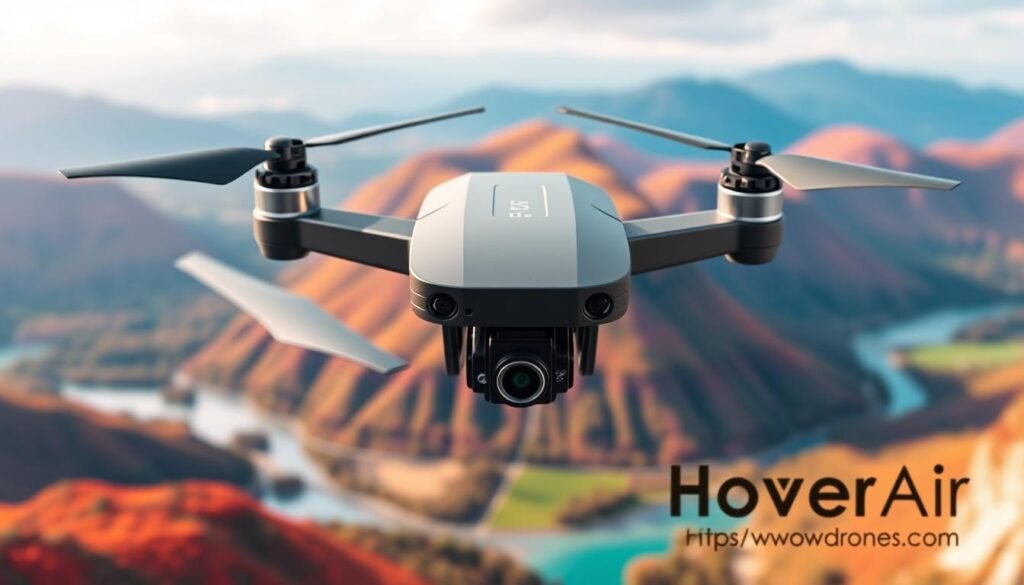
This beginner selfie drone stands out with its impressive features. Its 4K camera captures video at 60 fps and Full HD at 120 fps. You’ll create smooth, stunning footage that wows your friends and followers.
The HoverAir X1 Pro resists winds up to 24mph (Level 5). This allows flying in various terrains and at night with OmniTerrain active. It boasts 15 times more NPU power than its predecessor, the HoverAir X1.
| Feature | HoverAir X1 Pro | HoverAir X1 Pro Max |
|---|---|---|
| Video Resolution | 4K@60fps, 1080p@120fps | 8K@30fps, 4K@120fps, 4K HDR@60fps (10-bit HLG) |
| Camera Sensor | Type 1/2 CMOS, 17mm-equivalent lens | Type 1/1.3 CMOS, 16mm lens |
| Max Speed | 37mph (60km/h) | 37mph (60km/h) |
| Wind Resistance | Level 5, up to 24mph (39km/h) | Level 5, up to 24mph (39km/h) |
| Battery Life | 16 minutes | 16 minutes |
The HoverAir X1 Pro is perfect for beginners and experienced pilots alike. It features built-in propeller guards for safety. You can even launch and land it from your palm.
The HoverAir X1 Pro is the ultimate beginner selfie drone, combining ease of use with powerful features and stunning image quality.
Ready to elevate your selfie game? The HoverAir X1 Pro is your ideal choice. It offers impressive specs and user-friendly design at an affordable price. This aerial selfie drone will become your go-to companion for all adventures.
DJI Neo: The Best Drone for Multi-Control Options
The DJI Neo revolutionizes drone technology with its versatile control options. This innovative drone allows you to fly without a controller. It gives beginners the freedom to explore the skies effortlessly.
The Neo records stunning 4K/30fps video, capturing clear footage in all lighting conditions. With an 18-minute flight time, it can perform over 20 consecutive excursions. This makes it ideal for capturing aerial moments.
Controller-Free Flight
The Neo’s controller-free flight mode is perfect for beginners. Connect the drone to your smartphone via Wi-Fi for a 50-meter control range. Advanced stabilization algorithms ensure professional-looking footage.
FPV, Remote, and App Control
The DJI Neo offers various control options beyond controller-free flight. These include FPV goggles, remote control, and app-based control. This variety allows users to experiment with different flying styles and perspectives.
| Feature | Specification |
|---|---|
| Video Recording | Up to 4K/30fps |
| Flight Time | 18 minutes |
| Control Range | Up to 50 meters (Wi-Fi) |
| Stabilization | Reduces image shakes, corrects horizon tilt within ±45° |
| Weight | 135 grams (0.3 pounds) |
| Camera Sensor | .5-inch, 117.6-degree FOV, f/2.8 aperture |
The DJI Neo Combo, priced at $280, includes essential accessories for superior flight control. It comes with three intelligent batteries, propeller guards, and a Two-Way Charging Hub. The hub charges three batteries simultaneously, improving efficiency.
The DJI Neo is an excellent choice for beginners and content creators alike. Its multi-control options and impressive camera capabilities make it stand out. This versatile tool is one of the best drones for beginners in 2025.
Tips for Flying Your First Drone
Flying a drone for the first time is exciting, but safety comes first. Learn the rules, pick the right spot, and master basic controls. These steps will help you enjoy successful flights.
Understanding Drone Regulations
Know your local drone laws before takeoff. In the US, register as an operator if your drone has a camera. Get a TRUST Certificate for drones over 250 grams.
European rules limit free-flying drones to 120 meters. Drones over 249 grams need a Basic A1-A3 certificate. C2 labeled drones require an Additional A2 certificate. Check your area’s specific laws.
Choosing a Safe Flying Location
Find a spacious area away from people, buildings, and trees. Parks, fields, and beaches work well for practice. Keep your drone in sight and avoid restricted areas like airports.
Mastering Basic Flight Controls
Learn these key controls for smooth flights:
- Throttle: Controls the drone’s altitude
- Yaw: Rotates the drone left or right
- Pitch: Moves the drone forward or backward
- Roll: Moves the drone left or right
Start with short, low flights in open areas. Gradually increase flight time and height as you improve. Land when the battery reaches 20% to stay safe.
Practicing with Beginner-Friendly Features
Many drones offer features to help new pilots. These tools can boost your skills and confidence.
| Feature | Description |
|---|---|
| One-Key Takeoff/Landing | Automatically launches and lands the drone with a single button press |
| Altitude Hold | Maintains a consistent altitude, allowing you to focus on other controls |
| Return-to-Home | Automatically returns the drone to its takeoff point when activated |
| ActiveTrack | Follows and tracks a selected subject, keeping it in frame |
| QuickShots | Preset flight paths for capturing cinematic footage |
Use these features to capture stunning aerial shots while improving your skills. They’ll help you become a better pilot.
The Best Drones for Beginners: Compared and Reviewed
Picking the right beginner drone can be tough. We’ve tested many options to help you choose. Our guide compares the top drones for new pilots.
Key factors include ease of use, camera quality, and flight time. Good beginner drones cost between $200 and $1,000. Some great options are the DJI Neo, Mini 4K, Mini 3, and Mini 4 Pro.
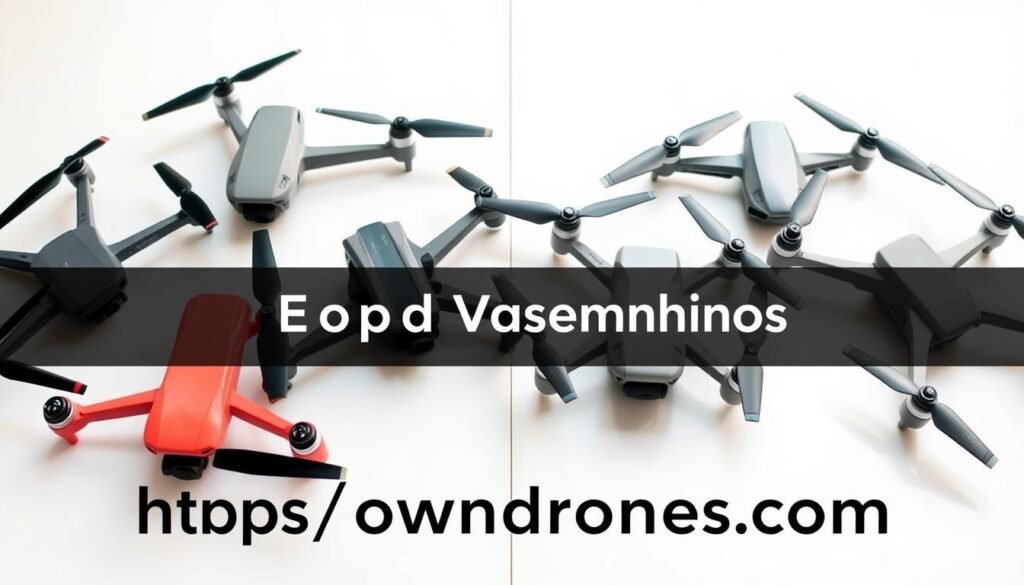
Drones under 249 grams don’t need FAA registration. The DJI Mini 4K and Autel Robotics EVO Nano+ fit this category. They offer 4K video and obstacle avoidance sensors.
Know your local drone laws before flying. In the US, UK, and Canada, you may need to register your drone. You might also need to take an online test and pay a fee.
Age requirements for drone flying vary by country. Check your local laws to be sure.
| Drone Model | Flight Time | Weight | Range | Camera Resolution |
|---|---|---|---|---|
| Autel Robotics EVO Nano+ | 28 minutes | 249 grams | 4.3 miles | 8192 x 6144 pixels |
| DJI Air 2S | 31 minutes | 595 grams | 11.5 miles | 5472 x 3648 pixels |
| DJI FPV | 20 minutes | 1.53 kilograms | 10.4 miles | 3840 × 2160 pixels |
| HOVERAir X1 | 11 minutes | 125 grams | 30 meters | 4000 x 3000 pixels |
Choose a drone from trusted brands like Autel and DJI. They offer reliable performance and good support. As you progress, consider getting an FAA remote pilot certificate.
Make sure your drone is compatible with Remote ID. This will keep it useful in the future.
The sky’s the limit with the right beginner drone by your side. Happy flying!
Conclusion
Selecting the best beginner drone is vital for a smooth start. Our guide showcases top recommendations for 2025, suiting various skill levels and budgets. The DJI Mini 4K offers intuitive controls and automated modes for all-round capabilities.
The Ryze Tello is budget-friendly with a 13-minute flight time and 100m range. It’s perfect for those just starting out.
For premium features, consider the DJI Mini 4 Pro. It boasts 10-bit D-Log for exceptional video quality and 360-degree obstacle sensing.
The Autel EVO Nano+ is a worthy DJI alternative. It provides a 28-minute flight time and a 4K camera with a 1/1.28-inch sensor.
For FPV enthusiasts, the DJI Avata is an excellent choice. It features a 1/1.7-inch CMOS Camera Sensor and low-latency HD transmission up to 10km.
When choosing, focus on flight time, camera quality, and safety features. Aim for at least 15-20 minutes per battery.
Prioritize safety by understanding drone regulations and choosing safe flying locations. Practice regularly to build your skills and confidence as a pilot.
